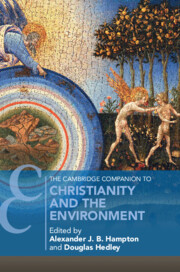Book contents
- The Cambridge Companion to Christianity and the Environment
- Cambridge Companions to Religion
- The Cambridge Companion to Christianity and the Environment
- Copyright page
- Contents
- Figures
- Contributors
- Preface
- 1 Introduction
- Part I Concepts
- 2 Naturalism, Supernaturalism, and Our Concern for Nature
- 3 From Disenchantment to Enchantment
- 4 Human and Nonhuman Animals from Secular and Sacred Perspectives
- 5 Anthropocentrism, Biocentrism, Stewardship and Co-Creation
- 6 Participation and Nature in Christian Theology
- 7 The Book of Nature
- Part II Histories
- Part III Engagements
- Index
- Cambridge Companions to Religion
- References
6 - Participation and Nature in Christian Theology
from Part I - Concepts
Published online by Cambridge University Press: 21 July 2022
- The Cambridge Companion to Christianity and the Environment
- Cambridge Companions to Religion
- The Cambridge Companion to Christianity and the Environment
- Copyright page
- Contents
- Figures
- Contributors
- Preface
- 1 Introduction
- Part I Concepts
- 2 Naturalism, Supernaturalism, and Our Concern for Nature
- 3 From Disenchantment to Enchantment
- 4 Human and Nonhuman Animals from Secular and Sacred Perspectives
- 5 Anthropocentrism, Biocentrism, Stewardship and Co-Creation
- 6 Participation and Nature in Christian Theology
- 7 The Book of Nature
- Part II Histories
- Part III Engagements
- Index
- Cambridge Companions to Religion
- References
Summary
The relationship between religion and concern for the environment has not always been an easy one. Theological ascription of ultimate value to God, rather than to creatures, has been said to underlie ecological destruction, exacerbated also by religious notions of human uniqueness. Conversely, some religious groups have feared that concern for nature will risk deflecting attention from God. Faced with such a stand-off, we turn to the idea of ‘participation’ – of partaking from, or sharing in – which offers common ground between these two domains, with its sense of dependence and derivation. From a theological perspective (here concentrating on the Christian tradition), particular emphasis will fall on the idea of creation as good gift, and on the derivation of all things from God, in all of their aspects. From the side of biology, themes of participation appear both in the form of ecological dependence in the present and of evolutionary relations of derivation and reception running down biological history. Approached in these terms, the theologian conviction that creation is not ultimate need not degrade it, nor need attention to creation stand in competition with religious devotion.
- Type
- Chapter
- Information
- Publisher: Cambridge University PressPrint publication year: 2022
References
Selected Bibliography
- 1
- Cited by

